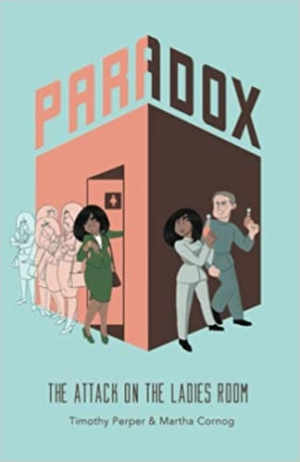Paradox
The Attack on the Ladies Room
The whimsical science fiction novel Paradox follows a team as they travel through alternate universes in search of a lost friend.
Timothy Perper and Martha Cornog’s quirky, time-traveling, reality-hopping science fiction novel Paradox features sardonic humor and a grounding in quantum physics.
Krylla and her husband John work for the Division of Esoterica, an agency responsible for addressing glitches among the paraverses, the alternate realities that spring up and branch off every time a scenario plays out in a new way. But then Krylla goes missing in a reality she doesn’t recognize: she fell into another dimension after stopping in the restroom en route to a meeting. John and his coworkers—including Siggy, who’s Hungarian; and Connie, a paratrooper—traverse worlds looking for Krylla, even as the mysterious Instrumentality they work for has instructed them to find a poet in another paraverse.
The chapters alternate between Krylla and John’s perspectives, though there are perspective leaps to other characters, too. Krylla, who has been waylaid by a wormhole, finds herself in a remote place and meets an alternate version of herself. John, aided by Siggy and his other coworkers, makes trips to universities and parallel universes, trying to find his wife. The warm, whimsical tone makes the search feel more incidental than urgent; there seems little chance that anything bad will actually happen to Krylla or the parties searching for her. Even their long-time enemy, Wessel, is not fleshed out enough to seem truly threatening.
Repetition is used as a narrative device to demonstrate the subtle ways in which the paraverses split off from each other because of minute actions, but the technique also confuses the book’s progression. And chapter-long digressions on matters of quantum physics lessen the tension further, leading to lulls in the plot. The book’s end notes are also didactic, explaining the literary and cultural allusions that arose, and the acronyms used, throughout.
But the prose is evocative about its details, ably focusing on thrilling locales and their denizens, including blue-haired musicians playing on a street corner in the poet’s haven, and the fish-spangled headgear of a long-lost aunt who shows up in a tavern. Still, while the central cast of characters is distinguished by their individualized speaking patterns, with tones that are reminiscent of dry British comedies, they are otherwise indistinctive. Krylla experiences a metaphysical awakening; most of the rest remain unchanged by their experiences, though.
Whimsical but plodding, the science fiction novel Paradox follows a team as they travel through alternate universes in search of a lost friend.
Reviewed by
Jeana Jorgensen
Disclosure: This article is not an endorsement, but a review. The publisher of this book provided free copies of the book and paid a small fee to have their book reviewed by a professional reviewer. Foreword Reviews and Clarion Reviews make no guarantee that the publisher will receive a positive review. Foreword Magazine, Inc. is disclosing this in accordance with the Federal Trade Commission’s 16 CFR, Part 255.

